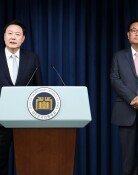Audible public prayer
Audible public prayer is unique to Korean Protestantism as it is even called as Korean Pray," though it can also be found in other countries. Audible public prayer began at the 1907 spiritual movement in Pyongyang, which was the capital of Korean Christianity in the first half of the 20th century. With audible public prayer, each congregation member verbalizes his or her own prayer unlike meditative prayer. This explanation is not enough, however, as the audible prayer is like crying out. Protestant history at the time described the audible prayer at Pyongyang`s spiritual movement as similar to a mourner`s lament.
President Lee Myung-bak and his wife kneeled for audible public prayer at a national prayer breakfast Thursday. Audible public prayer does not require getting down on knees and most Protestants pray while sitting these days. Several Protestant groups in Korea reject audible public prayer in their official services. The Rev. Kiel Ja-yeon, chairman of the Christian Council of Korea who led the prayer breakfast, proposed audible public prayer, which was not planned. President Lee got down on his knees and began to pray with his hands clutched together on his knees. His wife kneeled with her hands touching the floor. After this prayer was reported by the media, domestic Buddhist organizations issued statements expressing resentment against the president`s audible prayer at the breakfast.
The state prayer breakfast is hosted by Protestants but has a strong official meaning. Since the first event in 1968, successive Korean presidents have attended almost all of them but President Lee was the first to kneel in prayer. The National Prayer Breakfast began in the U.S. to stress national unity. Former U.S. President George W. Bush never got down on his knees in public. Catholic priests attended the breakfast in Koreas early days but now only Protestants are involved.
President Lee, who is Protestant, can pray with his family at home and go to the church he frequented before he became president. Many people said the president should have been more careful about kneeling in public at a time when the Buddhist community protests his administrations pro-Protestant slant. In addition, domestic Protestants opposed the governments move to issue Islamic bonds called sukuk. People of all faiths must try to maintain Koreas long tradition of peaceful religious coexistence.
Editorial Writer Song Pyeong-in (pisong@donga.com)
Headline News
- Med professors announce intention to leave hospitals starting Thursday
- Bridge honoring Sgt. Moon Jae-sik unveiled in Pennsylvania
- Chief of Staff Chung tells presidential secretaries to stay away from politics
- US FTC bans noncompete agreements
- N. Korea launches cyberattacks on S. Korea's defense companies







